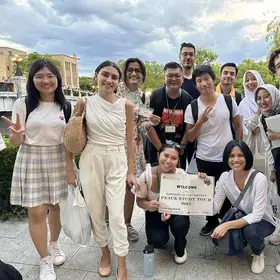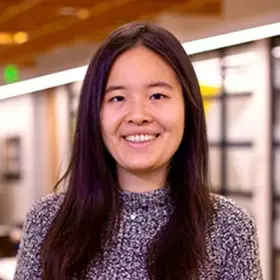By Vladislav Shepelenko, Applied Analytics student
Columbia University is a beacon of innovation and knowledge, attracting people from all over the world to share ideas and brainstorm solutions to the most pressing global challenges of our time.
The annual United Nations International Computing Centre (UNICC)-Columbia University Thinkathon is an event that helps to amplify the innovation taking place at Columbia and beyond. The competition is a collaboration between the UNICC and the SPS Career Design Lab where students and graduates from universities across the country and around the world (with at least one participant from Columbia) work together to solve problems related to digital diplomacy and quality education.
This past spring, I had the privilege of participating in this event along with my team, DigiSolvers, comprised of current students in the Columbia University School of Professional Studies’ Applied Analytics program—You “Ilona” Wu, Sam Kadouh, and myself—as well as a recent graduate of the program, Yazan Ali (’23SPS, M.S. in Applied Analytics), and María Ramírez Ruiz-Bailón, an aerospace engineering student from Universidad Politécnica de Madrid. Our team wanted to leverage contemporary data science techniques to tackle a problem that was relevant and meaningful in the modern world.
One issue quickly became apparent to our team: We are surrounded by an enormous amount of information, making it increasingly difficult to find reliable news that has not been misrepresented or fabricated, which has been exacerbated by the proliferation of AI-generated content.
Around the same time, we were exploring graph networks in the Managing Data course in the Applied Analytics program. We’d started learning graph database systems and applying them to large real-world datasets.
One day, the idea for the project came together: A graph database could be extremely useful in tackling the “fake news” problem, and the UNICC-Columbia University Thinkathon would be a perfect platform to pitch the idea to a larger audience.
Our solution was to organize online news articles in the form of a graph network, where each node represents a particular news piece, and the connections between them are the citations or references. It would function as a sort of search engine, and the user would be able to detect patterns in data just by looking at the graphs. For example, our system could help the user discern if a news piece originated in one place and propagated across the network, or if it was confirmed by multiple unrelated news outlets. Adding to this, specific graph analysis techniques would help put more weight on the underreported nodes, consequently elevating voices that are usually overlooked.
The concept was very well-received, and despite the extremely tough competition and outstanding projects from the other teams, we won first place in the Digital Diplomacy Challenge. We also received valuable feedback from the mentors, judges, organizers, and other students. Although it is still a conceptual prototype, I have high hopes for the idea and will see how we can proceed with it in the future.
It was a truly incredible experience for my team and me, and I wholeheartedly encourage other students to seek out similar events and test out their ambitious ideas. My story serves as an example of how you can utilize creativity and past experiences to tackle a problem from a different angle. Let us all continue to explore how we can work together and drive meaningful change—each one of us in our own unique way.
About the Program
Columbia University’s Master of Science in Applied Analytics prepares students with the practical data and leadership skills to succeed. The program combines in-depth knowledge of data analytics with the leadership, management, and communication principles and tactics necessary to impact decision-making at all levels within organizations


